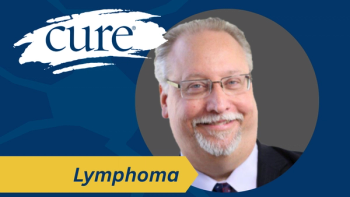
- 2021 Rare Cancers Special Issue
- Volume 9
Never Back Down: Lymphoma Survivor Stays Positive
In his new memoir, a patient with central nervous system lymphoma emphasizes the importance of a positive mindset and a strong support system.
PHYSICAL ACTIVITY WAS ALWAYS an important part of Steve Kelley’s life. Whether playing flag football or mountain biking, he strove to face the trials of life in the fast lane — even after receiving a diagnosis of central nervous system (CNS) lymphoma in 2018 at 63 years old.
Kelley stared cancer in the face with tenacity and a smile, all while hardly getting off his bike. Now he has published his experience in a memoir, “Cancer R.I.P.: The Ultimate Fight.”
CNS lymphoma is a rare non- Hodgkin lymphoma (NHL) in which malignant cancer cells from lymph tissue form in the brain or spinal cord. This aggressive form of NHL constitutes 4% of all brain tumors and develops in approximately 5 individuals per million each year in the United States, for an estimated 1,500 cases annually, according to the National Organization for Rare Disorders. Symptoms vary depending on the location of the tumor and may include headaches, vomiting, facial weakness, and cognitive and behavioral changes.
Kelley’s primary symptoms came in the form of cognitive changes that affected his memory. In 2018, he found himself driving home from work for three hours — even though his office was six miles away from his house.
“I kept taking turns and coming to places that I didn’t recognize, and yet I knew the whole area,” he remembered.
It wasn’t until he couldn’t find his way out of a local home goods store, where the aisles were organized in parallel grids, that he accepted that something was wrong. “It was a really scary moment to not be able to find my way back to the store entrance that I’d come in at,” he said.
Within the pages of his book, which was released in May, Kelley describes his cancer journey from diagnosis to treatment and beyond in hopes of giving other patients with rare cancer the point of connection that he struggled to find. “I felt a little bit distanced from anybody who might have had my disease,” he said. “I decided that I would write a book, and then people would be able to read about what it was like to have a serious brain disease.”
The book also includes a chapter called Saints and Angels comprised of stories written by Kelley’s family. “My sister, wife, grandchildren, sons ... they got to write ... what it was like to experience (my diagnosis) with me,” Kelley explained. “It’s a whole section devoted to the family’s experience of cancer.”
Readers can expect stories of count- less ups and downs, from Kelley’s struggle with MRIs (a fear that was first realized after he tore his rotator cuff playing slow pitch softball in 2003 and faced two more times before his diagnosis) to pranking his medical team, creating fake side effects by placing a miniature light-up traffic cone under his shirt and having two large carrots hanging out of his mouth.
Kelley’s health care team also participated in the book; his oncologist, Dr. Lakshmi Nayak, director of the Center for CNS Lymphoma at Dana-Farber Cancer Institute and an assistant professor at Harvard Medical School in Boston, wrote the book’s forward.
Nayak describes Kelley as an “eternal optimist” who never stops smiling. “As you journey with him, (Kelley) points out how each experience informed his life with lessons,” she wrote. “He reveals his deepest secrets and eloquently exposes the fragile nature of the human mind and body.”
According to Kelley, major takeaways from the book include the importance of developing your support team — whether it consists of medical personnel, family or friends — and challenging your mind and staying physically active. While undergoing treatment, he never slowed down. In fact, he insisted on having a stationary bike in his hospital room and riding it throughout treatment.
“I’d be on my bike, and there’d be multiple IV lines attached all around me, and I would just stay on the bike for as long as I could,” he explained. “I got down to 10 (white blood cells), and even at that point, I was still getting on the bike.”
When out of the hospital, he continued riding with his mountain bike group and credits that with keeping his mind active and sharp. “Just learning to look ahead and around the corner and (to) expect another route or stone ... really forced me, at a fast pace, to make my brain work,” he recalled.
Kelley said it’s important to remember to stare cancer square in the face and to handle the situation with grace. “A positive attitude is really helpful for everyone around you and for you as well,” he concluded, noting that the goal isn’t just to survive but also to thrive.
Listen to CURE®'s podcast with Kelley:
Articles in this issue
over 4 years ago
Staying Aware of Gastric Cancer Risk Factors in Young Adultsover 4 years ago
The Power of Human Connection in Cancerover 4 years ago
Exploring Potential Treatment Options for Rare Cancersover 4 years ago
Life With von Hippel-Lindau Diseaseover 4 years ago
Navigating the Unknown of Rare Cancersover 4 years ago
Keeping Faith After a Sarcoma Diagnosisover 4 years ago
Training for a Marathon: Managing Health After an MPN Diagnosisover 4 years ago
Novel App Informs Patients With Cancer of Unknown Primary



